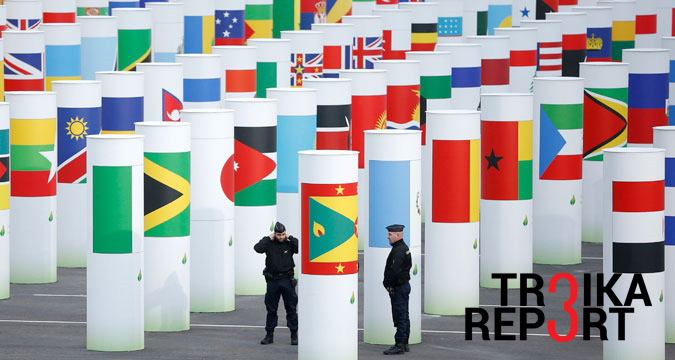
French police officers patrol in front of the entrance at the venue for the World Climate Change Conference at Le Bourget, near Paris, France, Nov. 29, 2015.
ReutersA sense of urgency has brought the leaders and high representatives of 195 countries to the climate change talks being held in Paris, or COP21, to define commitments to a safer and healthy environment through restraints on man-made damage inflicted on nature.
With one of the primary goals being to prevent average temperature from rising by 2°C or more, which would spell disastrous consequences for human civilization, one of the main focuses was on cutting down on greenhouse gases and other pollutants. Air pollution alone is the cause of 3.7 million premature deaths each year around the world. The World Health Organization warns that, with more people moving to the cities, deaths from urban air pollution will increase substantially. The mooted solution, reiterated at the discussions in Paris this week, is a “green” economy.
The path toward a low-carbon economy and society in general terms must have a price tag. Who is in a position to bear the costs of introducing a green economy? Sergei Komlev, head of price formation and contract structuring at Gazprom Export, placed emphasis on the most environment-friendly of the fossil fuels, natural gas, one of Russia’s main export commodities.
“Russia and Gazprom can support Europe in achieving its goal of reducing emissions by continuing to supply natural gas. If you look at the history of our relations with Europe, in the time span of over 50 years we have supplied something like around 4,000 billion cubic meters of natural gas. These supplies have allowed Europe to switch to gas from high-pollution coal in power generation and also in commercial and residential sectors.
“Lately, we have made estimates that our deliveries and wider use of natural gas in power generation have allowed Europe to reduce the amount of CO2 emitted into the atmosphere by 1.5 billion tons.
“Now that the EU has set an ambitious target of reducing CO2 emissions by the year 2050, it has been realized that natural gas is the least expensive way of reaching this goal. With the broad use of natural gas in power generation, in the industrial and residential sectors, and as motor fuel in transportation, Europe would save up to 1 trillion euros.”
This optimistic scenario does not resonate well with the bread-and-butter and down-to-earth needs of many states, often called the “emerging economies.” With still a quarter of its population deprived of electricity, India cannot precipitate cuts in GHG emissions, Prime Minister Narendra Modi admitted while pledging to cut Delhi’s emissions per unit of GDP by up to a third, without setting a date.
In Europe, not everyone is happy with the drive to reform the EU Emissions Trading System, as suggested in a document published in July 2015. It became clear that Poland, which is heavily dependent on the dominant share of coal in its energy balance, along with Latvia, Lithuania, Croatia, and Greece, would like to slow down the process in order to preserve the competitiveness of their industries.
How can Moscow contribute to the noble cause? And what are the challenges faced by the global community? Troika Report put these questions to Alexei Grivach, deputy director general of gas projects at Russia's National Energy Security Fund.
“First of all, Russian natural gas has been part of the European energy mix and contributed to cleaning it. The share of coal in the energy balance has fallen dramatically: from 71 percent in 1980 to 16 percent in 2010. In the same period, the share of gas almost doubled, from 14 percent to 27 percent.”
“It was a great time for European climate improvement aspirations, and fitted into the de-carbonization policy. Unfortunately, last year the European energy policy changed and ignored the ecological potential of natural gas. This irrational measure led to a decrease in the consumption of gas by 120 bcm in 2014 compared to 2010. That was the result of subsidizing renewables, which are good for mitigating climate change, but it also led to a rise in coal consumption in the European Union. So it ended up with a sort of coal ‘renaissance’ within the EU.”
– Is the arrival and steady flow of imported cheap coal to Europe a real setback for the goal of creating a “green” economy”?
“Coal is the main polluting substance for the environment, not only in Europe but around the world. It will make no sense talking about saving the environment if we do not address the issue of decreasing coal consumption globally.”
– What’s to be done?
“From my point of view, the solution is natural gas, nuclear power generation, and renewables when they are economically efficient. This is the best energy mix for the future world.”
Whatever the 195 nations agree on at COP21, it still remains a hurdle to define the exact legal status of the final, hopefully, universal document and its binding power. No less shaky is the issue of financing the long-overdue adaptation of the existing polluting practices and introducing mitigation measures.
Yet there seems to be a full understanding that the failure of the joint efforts to address the truly formidable global issue of climate change, affecting the lives of every individual on the planet, would have truly dire consequences for the future of mankind on Earth.
All rights reserved by Rossiyskaya Gazeta.
Subscribe
to our newsletter!
Get the week's best stories straight to your inbox